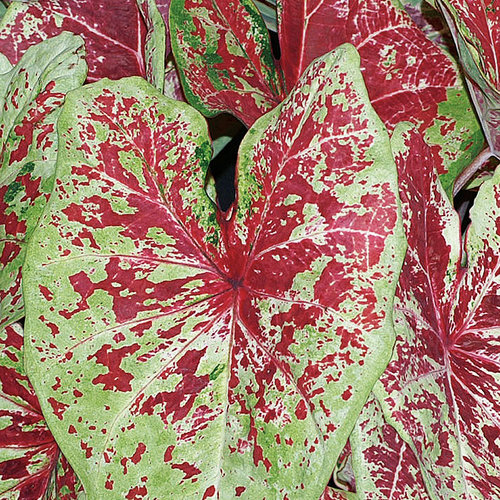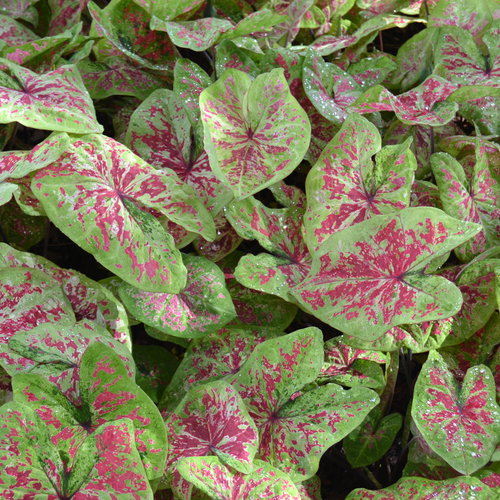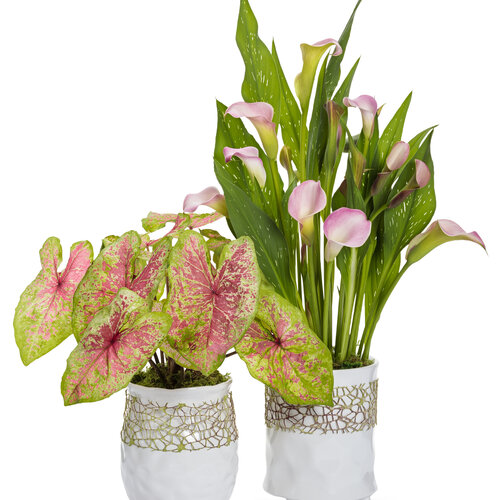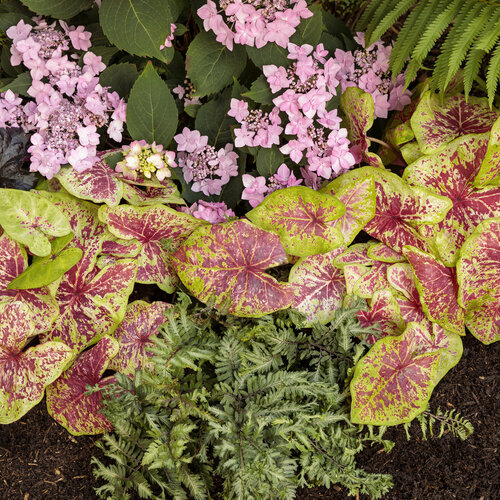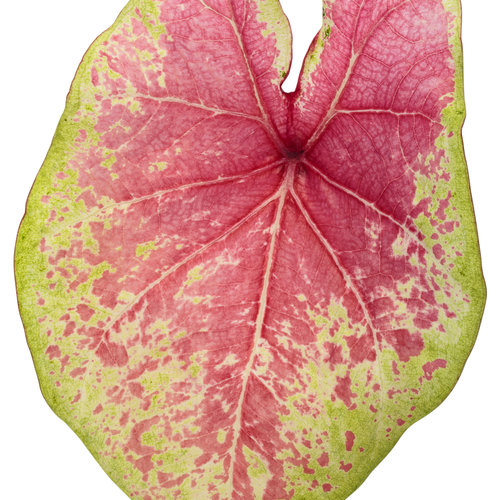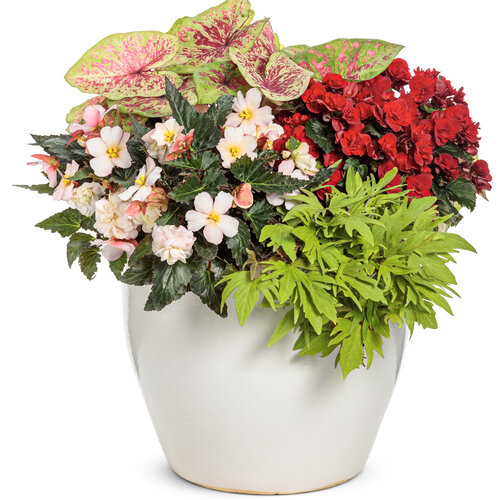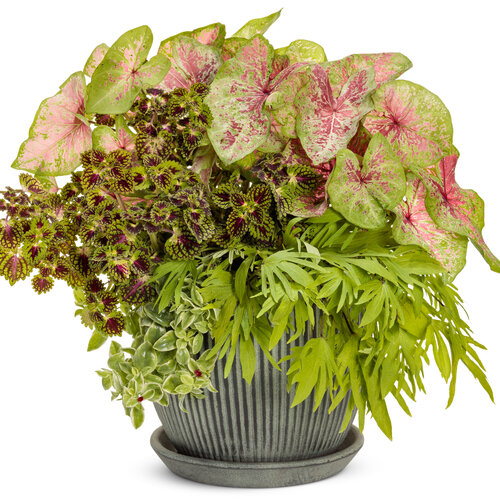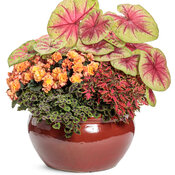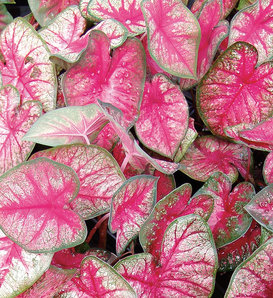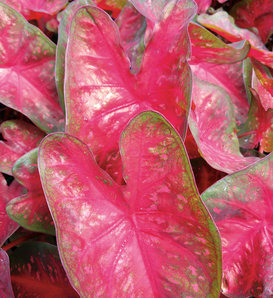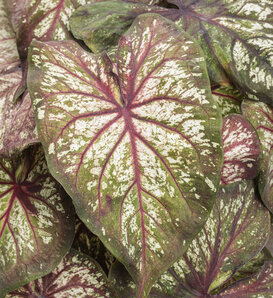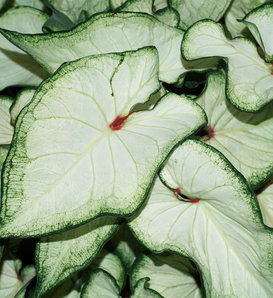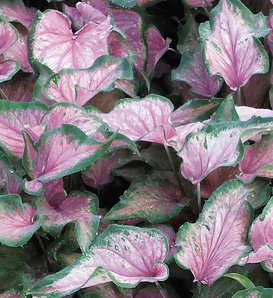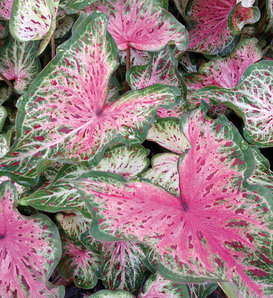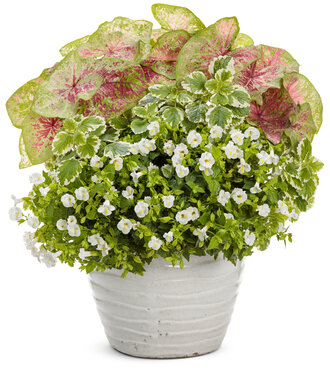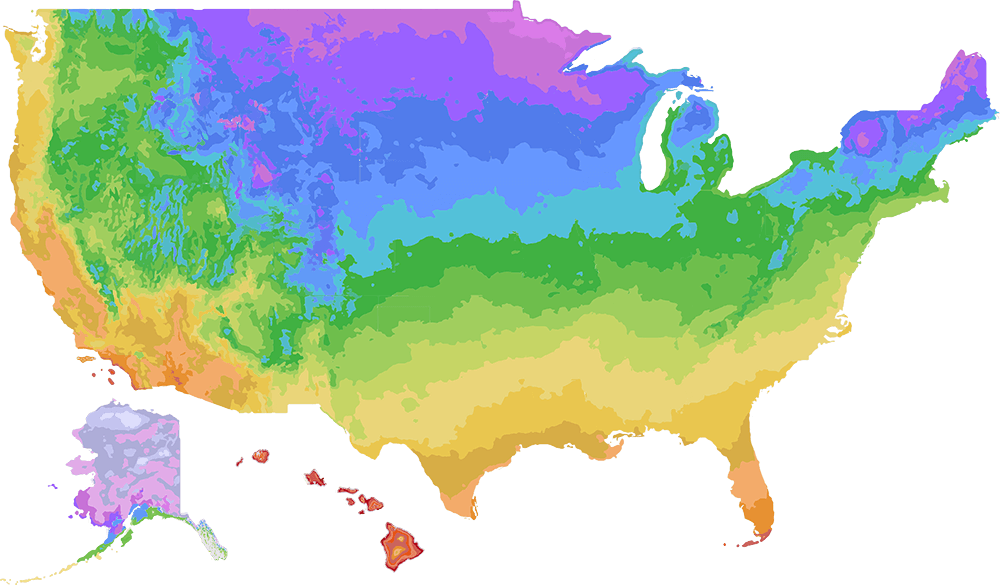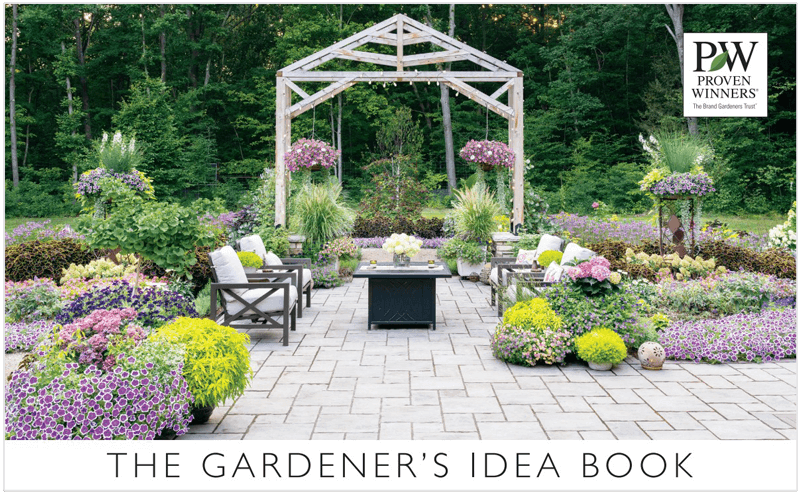Easy to grow, gives a great pop of color in the shade bed.
Heart to Heart® 'Raspberry Moon' Shade Caladium Caladium hortulanum
- Part Shade to Shade
- Spring
- Summer
-
15 - 20 Inches10 - 14 Inches10 - 14 Inches38cm - 51cm25cm - 36cm25cm - 36cm
Features
'Raspberry Moon' is a fancy-leaf variety with a light green to yellow background and it features blotches of dark green and raspberry pink to red which can cover most of the leaf. It performs best in part shade to shade. Caladiums are also generally considered to be houseplants where they prefer bright light or a sunny window.
Caladiums can be an irritant if ingested. The ASPCA has more information on which plants may be harmful.
Award WinnerAdaptable As HouseplantFoliage InterestHeat TolerantDeadheading Not NecessaryResists:DeerCharacteristics
Plant Type:AnnualHeight Category:MediumGarden Height:15 - 20 Inches 38cm - 51cmSpacing:10 - 14 Inches 25cm - 36cmSpread:10 - 14 Inches 25cm - 36cmFoliage Colors:GreenFoliage Colors:PinkFoliage Shade:Light Green with Raspberry Pink CenterHabit:UprightContainer Role:ThrillerPlant Needs
Light Requirement:Part Shade to ShadeThe optimum amount of sun or shade each plant needs to thrive: Full Sun (6+ hours), Part Sun (4-6 hours), Full Shade (up to 4 hours).
Maintenance Category:EasyBloom Time:Grown for FoliageHardiness Zones:10a, 10b, 11a, 11bWater Category:AverageUses:Border PlantUses:ContainerUses:LandscapeUses:Mass PlantingUses Notes:Heart to Heart 'Raspberry Moon' Caladium is great in landscapes and containers and will grow well in shade to partial shade locations. It can also be grown indoors as a houseplant where it prefers bright light or a sunny window.
Maintenance Notes:Caladiums can be an irritant if ingested. The ASPCA has more information on which plants may be harmful.
See our complete guide to caladium care.
Indoors:
Caladiums can be a very nice windowsill or sunroom plant and for much of the United States and certainly in Canada this might be the best use for Caladiums. Since they are tropical they need to have warmth and humidity, try to always keep the temperatures above 65 F for best growth and leaf size, and a pebble tray or frequent misting can help to keep humidity up around your plants. If you live in a northern climate, be careful not to plant too early in spring as temperatures below 50F will chill and stunt plants, normal indoor temperatures should be fine and winter heaters usually dry things out a bit too much. So this can be a good guide for when to grow these Caladiums, when you turn the heater off for the summer.
Plant tubers pointed end facing upwards, so the tuber is about 2” below the soil level, the roots form on the top of the tuber , so you need to plant them deep enough that roots have room to grow, but not too deep because it delays new leaves and weakens the plant. If your plants are already growing in pots when you purchase them, plant them about ½” deeper when you transplant them to make sure the tubers have room to keep growing.
Caladiums do not need a lot of fertilizer, about ¼ of what most folks feed their flowering annuals, and too much fertilizer can burn the leaves especially the white portions of the leaf. So just fertilize with ¼ the strength what you normally do for your flowers and apply weekly or every other week.
Keep plants in a sunny to partly sunny location and avoid burning hot southern exposures especially at higher altitudes.
Keep soil in your pots moist at all times, wilting will cause leaves to yellow and drop, so just check to make they do not dry out!
Outdoors:
Since Caladiums prefer heat and humidity and do not tolerate cold, soggy soils, for most gardeners who live in the north will have best results in containers, as the soil in pots or planters warms up faster and has better drainage so plants will not become soggy. Remember for best growth always keep the temperatures above 65 F.
A ¼ - ½ strength fertilizing every week or every other week is fine throughout the season, too strong a fertilizer can burn leaves, and since the leaves last all season you want to keep them looking fresh. Caladiums like to be moist at all times so avoid allowing them to dry out as it also causes leaves to yellow and drop.
Where the Caladiums will do best depends a lot on your location within the US, since sunlight intensity varies depending on where you live here’s a quick reference to help guide to help you succeed.
Region
When to Plant
Sun or Shade
Containers or in the garden
NW & NE United States & Canada
Early summer
Full sun - light shade.
Caladiums do best in containers in this part of the country and usually need to be in a protected warm location for best results. Like a sunroom or warm patio setting. If growing outdoors select the warmest protected locations in the garden.
SW United States
Spring
shade to light shade only
Containers may be easiest but a shady, cool garden spot can also be lovely. Watch your watering to keep the plants from drying out.
Midwest
Late Spring
Light shade
Containers are likely best, but a late spring planting into a protected shade flower bed will also be fine.
SE United States
Spring
Shade to sun
Both containers and garden plantings work fine, in the deep south Caladiums may even come back the following year if kept dry over the winter.
Fun Facts:2022 National Caladium of the Year.
Heart to Heart® 'Raspberry Moon' Caladium hortulanum USPP 20,069 -
514321Browse reviews from people who have grown this plant.
-
Joyce, Ohio, United States, 1 year ago
Award Year Award Plant Trial 2024 Top Performer Cincinnati Zoo and Botanical Garden 2021 Top Performer Cincinnati Zoo and Botanical Garden 2020 Top Performer Cincinnati Zoo and Botanical Garden 6 More Recipes- Heart PoundingRecipe
What you'll need:
-
1
-
1
-
1
-
1
-
- Nature ReserveRecipe
What you'll need:
-
1
-
1
-
2
-
1
-
1
-
-



